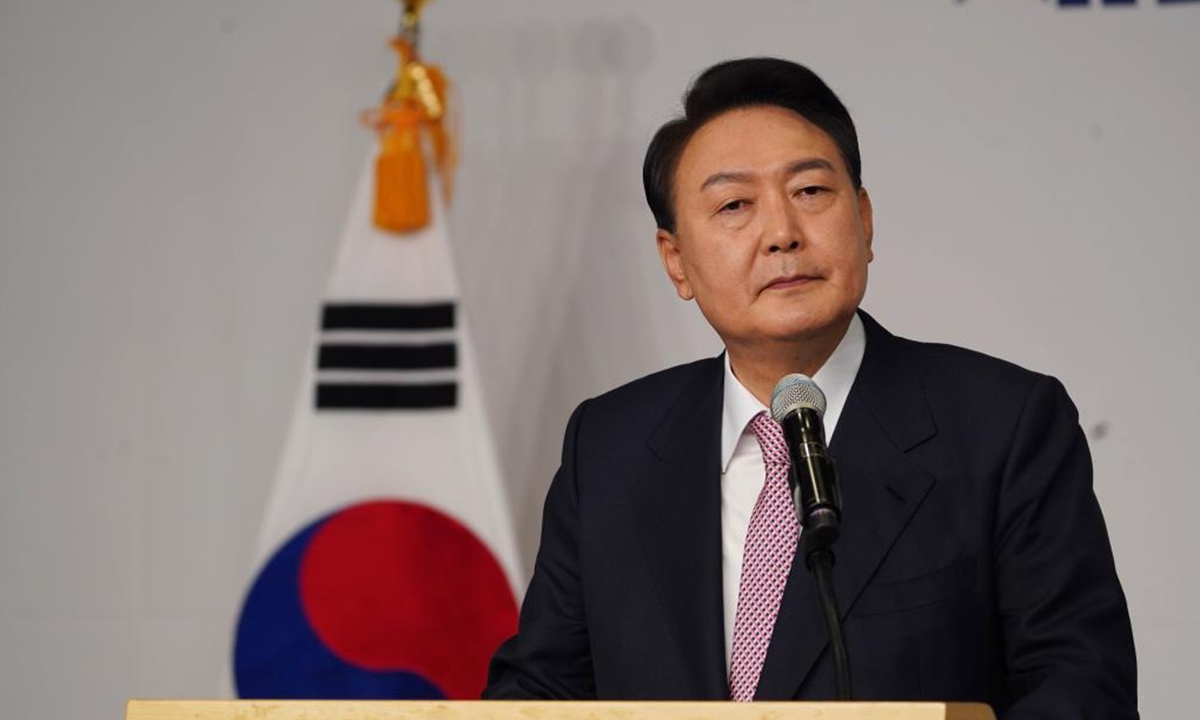 Yoon Suk-yeol Photo: Xinhua
Yoon Suk-yeol Photo: Xinhua
The US-South Korea leaders' joint statement issued on Saturday once again mentioned "the importance of preserving peace and stability in the Taiwan Strait." This line also appeared in the joint statement issued in 2021 between the two countries, the first time the Taiwan Straits had ever been mentioned in such a joint statement. References to the Taiwan Straits in such a document for two consecutive years signal that South Korea is cooperating with the US to intervene in the Taiwan question.
The latest joint statement added that the peace and stability in the Taiwan Straits is "an essential element in security and prosperity in the Indo-Pacific region."
"This delivered a signal that South Korea might provide stronger support to the US involving Taiwan question, which is provocative to China," Xin Qiang, deputy director of the Center for American Studies at Fudan University, told the Global Times.
The practice of having mentioned the island of Taiwan in a joint statement between the US and South Korea for two consecutive years is in line with Washington's ambition in recent years. Washington has required its allies to increasingly express their positions over the Taiwan question, and even follow the US' lead to take some actions in this regard. With pressure from the US ramping up, many of its allies, including Japan and NATO, have echoed Washington over the Taiwan question. What's more, countries like the UK, France and Canada even sent warships through the Taiwan Straits.
By calling on its allies to take a stand on the Taiwan question and even do some small tricks, Washington also wants to show the Taiwan authorities the US' "firm support" toward the island in a bid to urge Taiwan to further provoke the Chinese mainland. This can enable the Taiwan island to become even more willing to be a pawn for the US to contain the Chinese mainland.
The US and Japan also named Taiwan in their joint statement in 2021 for the first time since 1969. In stark contrast with Japan, South Korea has rarely made radical remarks concerning Taiwan island unilaterally in the aftermath of issuing the joint statement mentioning Taiwan with Washington. This is because Japan has always been the "cornerstone" of the US' Asia-Pacific alliance system. The US hopes that Japan will do more to cooperate with it on the Taiwan question and has piled more pressure on Japan accordingly.
Furthermore, given the Korean Peninsula issue, South Korea is reluctant to make any aggressive rhetoric on the Taiwan question to provoke the Chinese mainland, which will complicate the Korean Peninsula issue and negatively affect South Korea itself.
The previous Moon Jae-in administration's mention of Taiwan in its joint statement with the US mainly came from US pressure. The incumbent South Korean President Yoon Suk-yeol, however, has pursued a pro-US stance. As Yoon has just come into power, it is time to look to the US. In this context, Yoon may be willing to echo the US toward the Taiwan question no matter whether or not the US has put pressure on him, in exchange for the US' support for his new government. Under the new leadership, whose policy preferences differ from those of its predecessor, Seoul would move closer to Washington on issues including the Taiwan question.
But the Yoon administration may only follow the US to make some rhetoric instead of taking any specific actions. It must be fully aware that China has many means to counteract South Korea. In addition, Seoul is incapable of making waves on the Taiwan question. No matter how pro-US a South Korean president may turn out to be, he cannot totally lean to the US after taking office.
"South Korea's biggest concern is not how to maintain the peace and stability of the Taiwan Straits, nor how to contain China's rise, but the Korean Peninsula issue. Any South Korean president who cannot tackle this problem will not be a competent one. And the security and stability of the Korean Peninsula cannot be achieved without China," Xin noted. It can be concluded that if South Korea makes trouble over the Taiwan question, it will definitely be itself which will ultimately pay the price.




